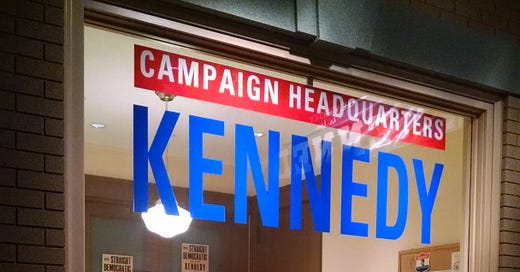Yesterday was the 61st anniversary of the assassination of President John Kennedy, on November 22, 1963.
The above photo is a replica of a campaign office for Kennedy’s 1960 presidential campaign, on display at the JFK Presidential Library and Museum in Boston, which somehow seems to represent a different, quainter era of American politics.
Perhaps that’s just what it feels like now, in retrospect, because it’s not like there weren’t combustible issues at the time. The Cold War with the Soviet Union. The fear of nuclear annihilation. The civil rights movement. McCarthyism. The country was certainly dealing with crucial topics and stark disagreements.
Still, you can’t see this 1960 television ad for Kennedy without thinking it’s a relic from a bygone time.
After becoming the youngest elected president in the country’s history, Kennedy’s presidency lasted barely 1,000 days before his death. The Kennedy assassination was, in many ways, the starting point of an era that would lead to dramatic changes in American democracy.
In the years following his death, the nation was convulsed by the Vietnam War and racial riots, while the Civil Rights and Voting Rights Acts of 1964 and 1965 led to an exodus of southerners from the Democratic coalition. Then, in 1968, the country was shocked by the assassinations of Bobby Kennedy and Martin Luther King, and the political system was shaken by the presidential candidacy of the segregationist George Wallace.
As I wrote in my recent series, Three Years that Broke American Politics, 1968 helped kick off a domino-like series of events that contributed to the rise of today’s tribal politics.
No one knows how, or even if, any of this might have been different had Kennedy lived. Many historians, for instance, believe JFK would never have escalated American involvement in Vietnam, as Lyndon Johnson did, though others disagree. Jeff Greenfield, meanwhile, speculated that JFK’s 1964 re-election campaign would have been challenging because southerners were upset with the president for pushing civil rights, but also that a two-term Kennedy presidency would likely have meant a lot less anger coming out of the 1960s.
If so, less anger in American politics might just have pushed the nation in a direction other than towards polarization and tribalism. But no one knows. Perhaps many of the same events would still have taken place. And perhaps not. It’s one of the big what-if questions of American history.
See more Travel Photos here.




